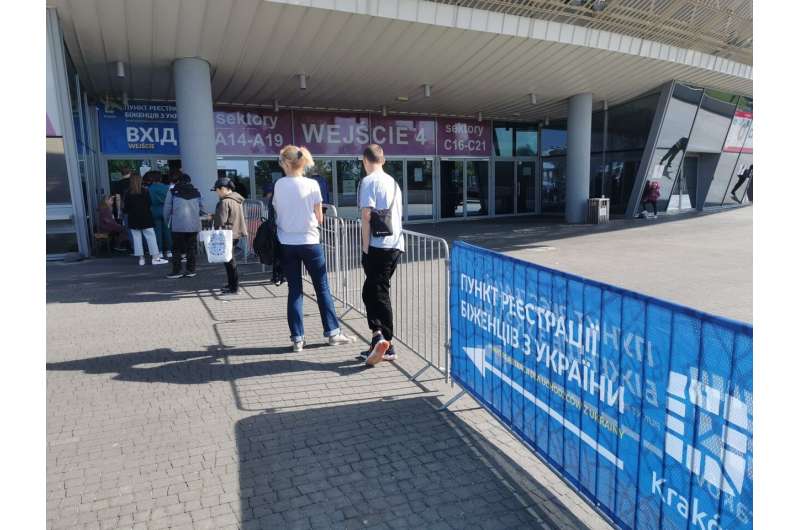
Kraków, Poland, taken at Tauron Arena. Credit: Konrad Pedziwiatr (UKrPL Team, Poland), CC-BY 4.0 (creativecommons.org/licenses/by/4.0/)
In a survey study comparing Ukrainian refugees living in Kraków, Poland with those farther away from Ukraine in Vienna, Austria, those in Vienna tended to have higher education levels, more prior work experience, and greater willingness to remain in their new area of residence. Judith Kohlenberger of the Vienna University of Economics and Business, Austria, and colleagues present these findings in the open-access journal PLOS ONE on December 20, 2023.
Since Russia’s ongoing invasion of Ukraine began in early 2022, nearly 8 million Ukrainians have fled the country. These refugees often tend to be female, in their mid- to late 30s, and more highly educated than the average Ukrainian citizen. However, it is less clear whether there are substantial differences between Ukrainian refugees who moved to countries closer to Ukraine—such as Poland, Slovakia, and Hungry—versus farther west, including Germany and Austria.
To help clarify, Kohlenberger and colleagues conducted surveys in the spring of 2022 involving adult Ukrainian refugees living in Kraków and Vienna. They analyzed responses from 472 participants in Kraków and 1,094 in Austria.
The analysis showed that survey participants in Vienna tended to have higher education levels, more prior work experience, and more experience living in urban environments than those in Kraków. The most commonly cited reason for choosing to live in Vienna was having a strong social network in the region. For Kraków, it was proximity to Ukraine.
Participants in Vienna were more likely to say they intend to stay there for the long term, while those in Kraków were more likely to have plans to return to Ukraine.
On the basis of their findings, the researchers suggest that state-funded financial support and living conditions—which are better in Vienna—may help shape the decision of where to move. The desire to start a new life outside of Ukraine might drive the decision to move farther west.
The researchers used a convenience sample which may not necessarily be representative of the wider population of Ukrainian refugees. However, they hope the research could inform integration policies in host countries, as well as Ukrainian policies to encourage the contribution of educated, skilled Ukrainians to post-war rebuilding efforts.
The authors add, “According to the analyzed convenience sample, a tentative conclusion is that the further Ukrainian refugees moved to the West, the more self-selected they tend to be in the key dimensions of formal educational attainment, previous employment, language skills, and urbanity.”
More information:
High self-selection of Ukrainian refugees into Europe: Evidence from Kraków and Vienna, PLoS ONE (2023). DOI: 10.1371/journal.pone.0279783. journals.plos.org/plosone/arti … journal.pone.0279783
Citation:
Specific characteristics of Ukrainian refugees linked to tendency to move farther west (2023, December 20)
retrieved 20 December 2023
from https://phys.org/news/2023-12-specific-characteristics-ukrainian-refugees-linked.html
This document is subject to copyright. Apart from any fair dealing for the purpose of private study or research, no
part may be reproduced without the written permission. The content is provided for information purposes only.
>>> Read full article>>>
Copyright for syndicated content belongs to the linked Source : Phys.org – https://phys.org/news/2023-12-specific-characteristics-ukrainian-refugees-linked.html










